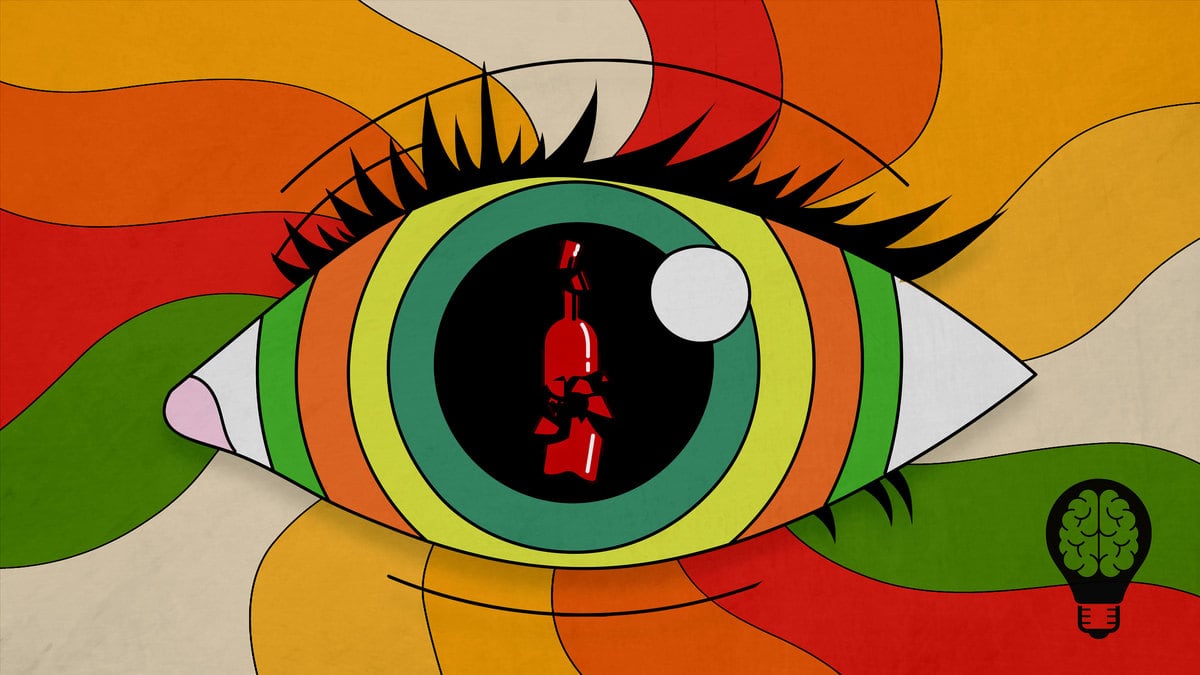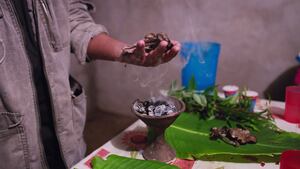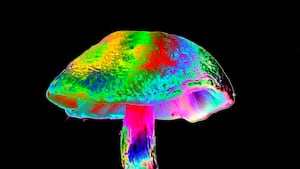Alcohol use disorder—more colloquially known as alcoholism—tends to happen slowly, and then all at once. Most people will say a few drinks in social settings starts to balloon into frequent drinks at home, in solitude. And eventually it’s perpetual, as habitual as a cup of coffee might be. Very quickly, the disorder can be incredibly debilitating as you find yourself living a life at the beck and call of addiction, sacrificing your relationships, career, and well-being for another drink to take the edge off. At worst, you’re digging your own grave with each sip.
That’s the reality for roughly 107 million people across the world who suffer from alcohol use disorder. While there are many reasons for the addiction, a lot of cases can be pinned on some combination of a genetic predisposition to addiction, and mental-health issues such as trauma or depression. Alcohol can become a means to cope with stress, depression, and anxiety. Think of the times you had a hard time at work and said something to the effect of, “I need a drink after that week,” or when you got some particularly bad news and cracked open a wine bottle to split with friends.
Of course, there are plenty of places to get help. Groups like Alcoholics Anonymous have provided support for millions of people over the decades. There are even medications such as naltrexone designed to treat alcohol use disorder. However, even these solutions aren’t completely effective. AA has an infamously low success rate of between 8 and 12 percent by some estimates. Naltrexone also comes with side effects like intense nausea and exhaustion, and it isn’t completely effective for many. It also requires the money and resources to get a prescription.
But, there’s an alternative solution that’s ready to burst onto the market that might raise some eyebrows: psychedelic drugs.
Scores of pharmaceutical companies and academic institutions have been researching the potential for psychedelics like MDMA, ketamine, LSD, and even DMT to be used in treating mental-health issues such as PTSD and treatment-resistant depression for years now. Even though the social stigma behind the drugs largely remains, they hold a lot of promise when it comes to treating some of the most pernicious public-health issues in society today.
“We’re just scratching the surface,” Brian Pilecki, a psychotherapist and psychedelic-assisted therapy researcher, told The Daily Beast. “Most have only been small trials that were highly controlled, but we’re seeing that the people who are in these trials are doing every well. These treatments have also been outperforming current treatments [for mental-health issues.]”
While the idea of treating one substance addiction with an illicit substance might seem strange, it’s actually been researched and practiced for decades. One such experiment is from Clairvoyant Therapeutics, a Vancouver-based biotech company that’s looking into developing the first commercially available psilocybin treatment for alcoholism.
“What it really comes down to is we want to help patients with alcohol use disorder,” Damian Kettlewell, CEO and co-founder of Clairvoyant, told The Daily Beast. “We want to enrich their lives, so we looked at all the different research out there and found a lot of promise with psilocybin.”
His company is about to launch Phase 2 clinical trials of a new study into psilocybin’s effectiveness in treating alcohol use disorder. It’ll be a blind study taking place in Canada and the E.U., and will include 128 patients with the goal of completing a report in 2023. The trial, Clairvoyant hopes, will give a little bit of a window into what a future for magic mushroom-assisted therapy might look like for those struggling with alcohol.
“This isn’t something where you take a pill and go home,” Kettlewell said. “It’s going to include 20 plus hours of psychotherapy.”
Here’s how Kettlewell and his company evision psychedelic-assisted therapy for alcoholism: patients would receive two 25 milligram doses of psilocybin over an eight-week treatment cycle. During this time, each patient would be tasked with recording the number of days they drink in a week along with how many drinks they have via a smartphone app. The dosing will also be paired with regular guided therapy sessions provided by certified mental health specialists.
“There’s upwards of over 20 hours of psychological therapy time,” Kettleman said. The goal of these sessions isn’t just to make you trip out or get all giggly like you see in the movies, but rather reach something called ego-dissolution—also known as ego death. This is a mental state that can be achieved via psychedelic use where your sense of space, time, and self are melted away. Beat writer and LSD-evangelist Timothy Leary referred to this as a “complete transcendence—beyond words, beyond spacetime, beyond self.”
It’s a bit woo, but there’s actually some compelling science behind this.
“There’s increased communication between various parts of the brain that don’t normally communicate when you take psilocybin,” Rick Strassman, psychedelics researcher at the University of New Mexico School of Medicine and author of the upcoming The Psychedelic Handbook, told The Daily Beast. “In a way, it corresponds to the subjective experience of tripping. Your ego becomes less rigid and you become more open to things which were normally suppressed or inhibited.”
Strassman has devoted much of his career to studying the effects of psychedelics on the human brain. That includes laying the groundwork for the latest investigation into how these drugs can remediate addiction: He co-authored a study in 2015 into the effects of psilocybin on patients with alcoholism where volunteers were given an orally administered dose of psilocybin along with regular therapy sessions. The University of New Mexico team found that the psilocybin-assisted therapy resulted in a 40 to 60 percent drop in alcohol use and dependence amongst its participants—especially in those who had particularly “intense trips,” Strassman said. In fact, the patients who felt the impacts of the magic mushrooms more strongly in the first session often had the biggest changes in their drinking habits in the following weeks. Cravings also decreased while abstinence increased as a result.
“There’s increased entropy in your brain [when you take psilocybin], which means it’s temporarily disorganized,” he explained. “Then it reorganizes based on the influences exerted on the mind around you. That can be used to reorganize it in a beneficial manner.”
Put it another way: Think of your brain like an Etch-a-Sketch. Right now, there might be certain drawings, shapes, and pictures on it that you don’t want—which you can look at as your bad habits like drinking. Psilocybin shakes up that Etch-a-Sketch, allowing you to draw something else on it instead—something new and healthy that can improve your life and mind. That’s where the therapy comes in. Psilocybin makes the mind more susceptible to suggestion and more easily influenced by the therapy sessions.
Strassman is quick to say that the sample size for the study was fairly small with just 10 volunteers. However, larger scale research, like the trial Clairvoyant is conducting, will build off of the findings and could help validate how magic mushrooms can help those with alcohol use disorder.
As promising as the drug is, though, there’s still a few good reasons for pause. Unlike most studies looking into psychedelic therapeutics, Clairvoyant didn’t conduct a formal Phase 1 trial. The company skipped that step entirely by referencing “existing safety data since 25 milligrams of synthetic oral capsules of psilocybin have been dosed in clinical trials with over 300 patients,” Kettlewell explained.
“It’s a bit unique. Our colleagues in biotech would be like, ‘How does a company catapult right into a phase two trials?’ But we were able to locate the appropriate information and safety information, and we’re able to move right into this trial.”
Strassman himself believes that jumping right into a Phase 2 study “doesn’t seem unreasonable or reckless” considering there’s a good amount of data from Phase 1 studies of psilocybin in normal volunteers. He added that regulators in Canada are “pretty stringent too” so they’ll be able to serve as a good check on these companies.
However, Strassman does warn that, in the interest of attracting capital, these nascent psychedelic pharmaceutical companies might be overselling what these cures can do. “Overzealous promises of panaceas in the psychedelic world are already common,” Strassman said, “but one would hope that regulators could keep the governor on.”
Pilecki agrees. “It doesn’t work for everybody,” he said. “What often gets left out is that there’s therapeutic work involved, painful work of facing our past and processing difficult emotions. That’s where psychedelics are helpful. They take the stuff we shove down and puts it in front of us. If people aren’t prepared for that, it could be overwhelming and scary.”
That isn’t to say that there isn’t immense amounts of promise in these drugs to treat not just alcohol use disorder, but a whole host of other substance addictions as well. Studies have found evidence that psilocybin-assisted therapy can help those struggling from drugs like cocaine, heroin, and even nicotine.
Still, this might seem a bit rushed—and in many ways it is. After all, the goal for companies like Clairvoyant is to get a product on the market as quickly as possible. If they don’t, they could lose out to their competitors. It’s the “If you’re not first, your last” ethos that has embedded itself in the spine of capitalism, and pharma is certainly no exception. If there’s a way they can get there faster than the competition, they’ll take it. In Clairvoyant’s case, that means skipping phase one trials while also limiting where they’ll be offering their eventual products to three markets: Canada, the U.K., and the E.U.
“We’re not focused on the U.S. because we believe that it’ll go generic faster in the States,” he said.
These pharmaceutical companies are also finding strange bedfellows in psychedelic advocates and hobbyists who want to see these drugs decriminalized and destigmatized. Medical research and studies showing their potential efficacy in fighting pernicious issues like depression and alcoholism can only bolster their efforts.
Strassman warned this could quickly devolve into a dangerous health-care landscape. “People are presenting psychedelics as a kind of super Prozac,” he said. “Movements like decriminalization are counting on medical research to say they’re safe and effective, but we don’t really know that yet. We’re kind of putting the cart before the horse.”
This digs at a larger issue with these biotech companies chasing after psychedelic treatments. While we think of drugs like LSD, mushrooms, and DMT as a means to have a deeply spiritual and mind-altering experience, what happens when it becomes infused with greenbacks and bottom lines of big pharma? If a drug that can, in theory, help millions of those living with alcohol use disorder is limited to select countries, what does that mean for those who don’t live there?
And, in the end, the answer to those problems doesn’t just lie at the bottom of a bottle.
This story is part of a series on exploring new innovations in mental health technologies and treatment. Read the other stories in our package here:








